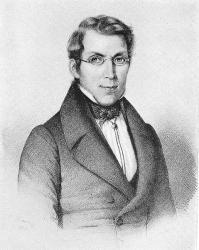Planning worship?
Check out our sister site, ZeteoSearch.org,
for 20+ additional resources related to your search.
- |
User Links
Person Results
Alexandre Rodolphe Vinet

1797 - 1847 Person Name: Alexandre R. Vinet, 1799-1847 Author of "My Savior And My Lord" in The Cyber Hymnal Vinet, Alexandre Rodolphe, born June 12, 1799, [sic 1797] at Ouchy, near Lausanne. His father, a man of somewhat stern religion, was schoolmaster of the village, and held a small appointment in the Canton du Vaud, Alexandre was appointed Professor of the French language at the gymnasium of Basle, at the age of 20, and occupied this office, with same work for the University, for twenty years. In 1819 he was called to the ministry, and married. At first opposed to the movement of the Réveil a deeper knowledge of its principles and deep sympathy with the persecution of its leaders, drew him heartily to its side. His pen was fearlessly used in defence of toleration (Du respect des opinion, 1824), freedom of worship (Mémoire en faveur de la liberty des cultesé, 1826), and the separation of Church and State (Essai sur la manifestation des convictions religieuses, et sur la separation de l’Église et de l’État, 1842). No work is more permanently valuable on the subject than the Essai, from the logical sequence of its conclusions from the premises laid down. In 1837 he had been recalled to Lausanne, to occupy the "chaire de théologie pratique," in the Academy. In the end of 1840, however, he resigned the chair, withdrawing at the same time from the national church. He took a prominent part in the preliminary committees for the formation of the "Église libre du Canton de Vaud"; but his proposals were largely modified in the final constitution of it, to his deep regret. He had been compelled to withdraw from the discussions by his failing health. His constitution, always delicate, gave way comparatively early, and he died May 10, 1847. His name is tenderly cherished, not only for his efforts in the cause of religious freedom, but as an Evangelical Divine and as a distinguished man of letters. His articles in the Semeur touched wide and varied subjects of literature with rare delicacy, acuteness, and truth. The hymns published in the Chants Chrétiens are only a few out of the number he wrote. They reveal the inner depth of a nature that shrank from outward demonstration of religious emotion, and are valuable on this account, as well as for that refinement of meditation which places them so high among the Protestant hymns of France. [Rev. H. Leigh Bennett, M.A.]
--Excerpts from John Julian, Dictionary of Hymnology (1907)
Alexandre Rodolphe Vinet
William John Blew
1808 - 1894 Translator of "The day is past and gone" in Hymns and Tunes Blew, William John, M.A., son of William Blew, born April 13, 1808, and educated at Great Ealing School, and Wadham College, Oxford, where he graduated B.A. in 1830, and M.A., 1832. On taking Holy Orders, Mr. Blew was Curate of Nuthurst and Cocking, and St. Anne's, Westminster, and for a time Incumbent of St. John's next Gravesend. Besides translations from Homer (Iliad, bks. i., ii., &c.) and Æschylus (Agamemnon the King), and works on the Book of Common Prayer, including a paraphrase on a translation of the same in Latin, he edited the Breviarium Aherdonense, 1854; and published a pamphlet on Hymns and Hymn Books, 1858; and (with Dr. H. J. Gauntlett) The Church Hymn and Tune Book, 1852, 2nd ed. 1855. Tho hymns in this last work are chiefly translations by Mr. Blew of Latin hymns. They were written from 1845 to 1852, and printed on fly-sheets for the use of his congregation. Many of these translations have come into common use. The following original hymns were also contributed by him to the same work:—
1. Christ in the Father's glory bright. Morning.
2. God's ark is in the field. Evening. The second stanza of this hymn is from Bp. Cosin's Hours, in his Collection of Private Devotions, 1627.
3. Hark, through the dewy morning. Morning.
4. Lord of the golden day. Evening.
5. 0 Lord, Thy wing outspread. Whitsuntide.
6. 0 Thou, Who on Thy sainted quire. Whitsuntide.
7. Sleeper, awake, arise. Epiphany.
8. Sweet Babe, that wrapt in twilight. Epiphany.
9. Ye crowned kings, approach ye. Epiphany. This is written to the tune “Adeste fideles," and might easily be mistaken as a free translation of the "Adeste."
Mr. Blew has also translated The Altar Service of the Church of England, in the year 1548, into English. His translations are terse, vigorous, musical, and of great merit. They have been strangely overlooked by the compilers of recent hymn-books. He died Dec. 27, 1894.
-- John Julian, Dictionary of Hymnology (1907)
William John Blew


 My Starred Hymns
My Starred Hymns

